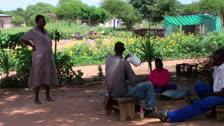Relative poverty is a term used on the news to mean people who have less money than those living around them. This term is generally used when talking, for example about “UK child poverty”. (Politicians even argue about whether such differences in wealth are a good or bad thing.)
Absolute poverty is different. Some people are much poorer. For them, a whole week’s income is less than the amount someone in the UK, on the legal minimum wage, earns in an hour (£5.93).
Absolute poverty means people whose income is less than 75p – £1.50 a day ($1.25 or 75p a day being “extreme poverty” according to the World Bank).
75p a day is typically not enough money to pay for the basics (food, clean water, clothing, shelter) needed to survive in reasonable health. In some of the videos on this website you will see examples of everyday poverty; like the video on the right of a boy in Malawi who was unable to go to school because he could not pay for soap to wash his school uniform.
Poverty in Africa
Social and economic causes
An Indian economist called Amartya Sen was given the 1998 Nobel Prize for economics for his analysis of Poverty and Famine. His work pointed out that in many cases the causes of famine were not society’s overall lack of food but much more social and economic.
Over the last 30 years, worldwide absolute poverty has fallen sharply (from about 40% to under 20%). But in Africa the percentage has barely fallen. Still today, over 40% of people living in sub-Saharan African live in absolute poverty.
Poverty is sometimes more about how a society shares money out than how much money there is overall. Some African countries are very poor, but others are wealthier (often from oil) with extreme inequalities between their citizens.
For this reason, some people take an unsympathetic view of poverty and starvation in Africa. Others suggest that more of a political struggle is needed. Actually the situation is more complicated and attempts to “interfere” often backfire, so we should be careful about jumping to conclusions.
Comparisons
Government and law
When there are no strong democratic traditions, an army can easily take over a country (in a “military coup”). Leaders who don’t have to worry about re-election can make themselves rich. Without a mature legal system, corruption and bribery make it difficult for businesses to establish and without industry, prosperity is elusive.
It’s easy for those living in England, with its 800-year history of human rights law and long political stability, to imagine the same situation should be found in the rest of the world.
But as recently as 1950, only four countries in Africa (currently there are 55) even had their own independent government; the rest were colonies of Western powers. The UK’s position as a former colonial power (with some of our national wealth derived from our history of owning colonies), means we have to be careful about “telling them what to do”.
Stable government and democracy, which are generally critical to eliminating poverty, are slowly developing across much of the continent. It takes many decades for stable government, economic stability and the rule of law to establish.
Progress
Over the last 60 years, some progress has been made in reducing poverty. Many countries have seen gains in health, education and living standards as their economies grow. But at the same time many of the countries have been struggling with the legacy of colonial rule, and war has been common as systems of government have developed.
Despite an overall picture of economic growth for the continent, some Africans are being left behind. Two-thirds of the United Nations ‘least developed countries’ (classified as those at risk of remaining poor) are in Africa.
In the Ivory Coast, 30 years of successful growth (between 1960-1990) was achieved from the realisation that, with a little help from government, grassroot farmers could generate their own wealth from agricultural exports. Sadly this model was broken and civil war erupted following problems in the global commodity markets (arguably because international aid caused an oversupply in world coffee markets).
The example above highlights two important aspects of poverty: that the best solutions work through income generated locally, but also that world markets and Western countries can have a devastating effect on the developing world.










